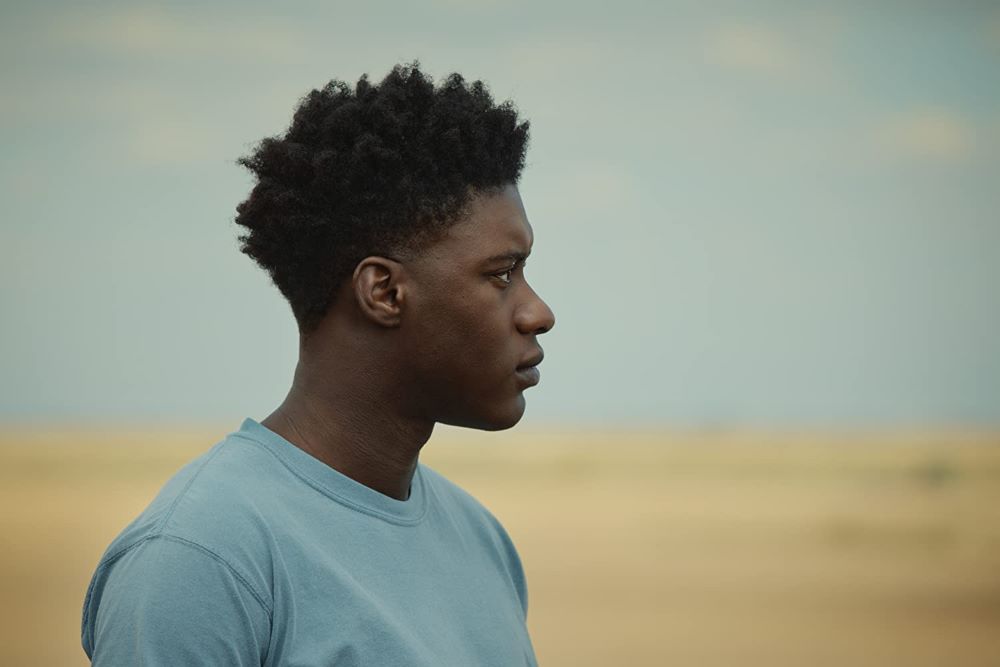
The Last Tree
2020, NR, 98 min. Directed by Shola Amoo. Starring Sam Adewunmi, Gbemisola Ikumelo, Nicholas Pinnock, Tai Golding, Demmy Ladipo, Ruthxjiah Bellenea, Denise Black.
REVIEWED By Marjorie Baumgarten, Fri., July 17, 2020
Both familiar and unfamiliar elements can be found in The Last Tree’s coming-of-age story. While the passageway from troubled boyhood to responsible manhood is a journey traveled in many a movie, it is renewed and refreshed by each subsequent generation. This second feature film by Shola Amoo, said to be semi-autobiographical, follows the customary storyline of a child whose development has been twisted by trauma and the choices he’s forced to make between recklessness and maturity as he becomes a young man. Yet the differences in Amoo’s story lie in the fact that its protagonist is a Nigerian-British youth and that the writer/director employs a host of expressionistic techniques that offer a degree of access into the character’s emotional turmoil.
Nigerian-British Femi (played by Golding as a boy and Adewunmi as a young man) grows up in the home of his loving foster mom (Black), a white person whose home lies in the British countryside. As the film opens, we observe Femi, the only black child in a sea of white faces, playing happily with his schoolmates. Femi does well in school, and roughhouses and plays sports with his friends, usually winning competitions in which his strength and physical agility are instantly noticeable. He is a happy child until the day his birth mother, Yinka (Ikumelo), comes for a visit and announces that she is finally ready to reclaim her son and bring him back to live with her in London. Curiously, the reasons for Femi having been placed in foster care are never provided, which complements this movie’s reticence to over-explain feelings and actions. Instead, the movie gives the sensation that we’re viewing Femi’s life in glimpses rather than a continual advance. We learn what we need to, but little more.
Femi’s unhappiness begins the moment his birth mother declares her plan for him to return. The shabby council estates apartment she lives in is no match for the wide-open countryside. (Watch out for the pee in the elevator, Yinka warns her son as he enters the building’s lift for the first time.) Yinka, a working mom, saddles Femi with strict rules and chores, and beats him with a stick for infractions, although we get the sense that her beatings derive more from inadequate parenting strategies than malignancy or innate aggression. The film’s middle section focuses on Femi’s steady drift toward petty crime as a neighborhood criminal (Ladipo) enlists and grooms the teen to become one of his new lieutenants. Although the beaten boy is adept at doling out physical punishments, we can also see that he internally wages a war between his tougher and softer sides. When asked by friends what he’s listening to on his headphones, he tells them Tupac when it is really the Cure.
Rich with technical strategies that enhance our view into Femi’s emotions, The Last Tree uses slow-motion, diffused sound, and many Spike Lee-like camera shots to make the story extremely personal and unique. The film’s third act, which plays more like a coda, takes place in Lagos, Nigeria, and leaves us wanting more. Femi’s daddy issues are still unresolved, as is his budding romance with a blue-haired girl (Bellenea). Amoo’s screen expressionism can sometime stray in slackness, although cinematographer Stil Williams’s contributions are estimable. Another bothersome aspect is that Adewunmi, despite a very good performance, seems too old to be playing a teenager. The film’s closing sequence, however, as Femi makes a mad dash across a beach, subtly brings to mind two coming-of-age classics, The 400 Blows and Moonlight. The Last Tree takes its place among them as a splendid heritage growth.
The Last Tree is available as a virtual cinema release. Choose from:
• AFS Cinema (Tickets here)
• Violet Crown Cinema (Tickets here)
A note to readers: Bold and uncensored, The Austin Chronicle has been Austin’s independent news source for over 40 years, expressing the community’s political and environmental concerns and supporting its active cultural scene. Now more than ever, we need your support to continue supplying Austin with independent, free press. If real news is important to you, please consider making a donation of $5, $10 or whatever you can afford, to help keep our journalism on stands.
The Last Tree, Shola Amoo, Sam Adewunmi, Gbemisola Ikumelo, Nicholas Pinnock, Tai Golding, Demmy Ladipo, Ruthxjiah Bellenea, Denise Black







